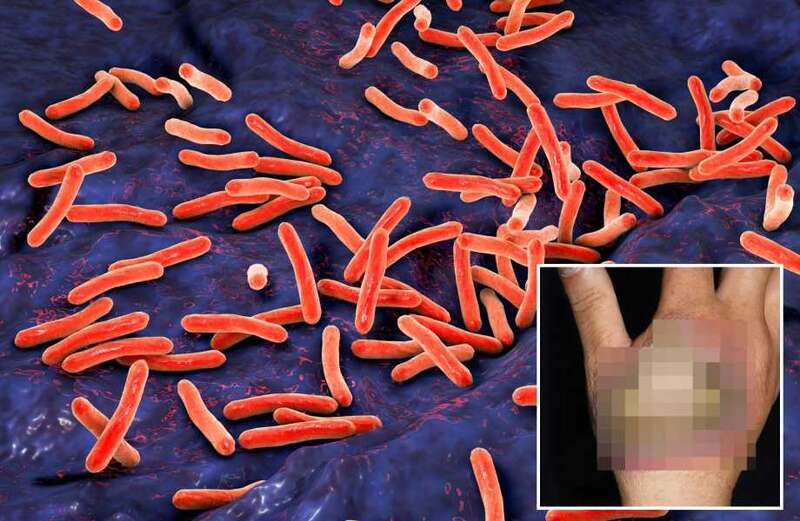A MAN suffered a rare side effect from a tuberculosis infection, breaking out it a crusty, yellow wart across his hand.
Dubbed the 'world's most deadly infection', tuberculosis (TB) is a bacterial infection that usually attacks the lungs and is spread through the coughs and sneezes of infected people.


But in a rare case, a 59-year-old man broke out in a giant, scaly wart as a result of the infection.
It comes as the UK sees a worrying resurgence in the Victorian disease, with 106 cases reported across England and Wales in the week leading up to June 16.
The patient, from China, had been suffering with a painful rash on his right hand for a year before visiting a dermatology clinic.
 Spectacular New Year fireworks light up London sky as huge crowds celebrate across UK for first time in three years
Spectacular New Year fireworks light up London sky as huge crowds celebrate across UK for first time in three years
Doctors examined the wart, which covered the back of the man's right hand and part of his index finger too, observing "thick yellow-brown crusting" and an inflamed red border.
According to a report published in The New England Journal of Medicine, the 59-year-old had no other symptoms, aside from the wart and the pain it was causing him.
The doctors then took a tissue sample from the lesion, analysing it under the microscope and performing genomic sequencing.
They were able to identify Mycobacterium tuberculosis, the bacteria causing tuberculosis infections.
After a computed tomography (CT) scan of the man's chest showed no TB in his lungs, doctors diagnosed him with a rarer form of the infection known as extrapulmonary TB.
It refers to cases where organs other than the lungs are affected, accounting for 20 per cent of TB cases.
Specifically, the man - a vet by trade - was diagnosed as tuberculosis verrucosa, also known as warty tuberculosis.
It can occur when can happen when M. tuberculosis enters the skin, typically through an open wound or abrasion.
This sub-type of the infection is even rarer, accounting for just 1.5 per cent of extrapulmonary TB cases.
The case report authors didn't discuss how the man might have been infected, but they noted that his job as a vet could be a possible risk factor.
 Robbie Williams poised to launch his own brand of energy drinks to rival Prime
Robbie Williams poised to launch his own brand of energy drinks to rival Prime
"Occupational exposure to mycobacteria, particularly among persons with frequent contact with livestock, is a risk factor," they said.
TB is usually treated with antibiotics and the man's skin infection was no different.
He was prescribed a six-month course of antibiotics, and within two months his wart had "abated," the doctors reported.
What is TB?
TB, once referred to as consumption, is an infectious disease caused by bacteria which affects the lungs.
It spreads in the air when people carrying the bug cough, sneeze or spit.
Symptoms include a cough for more than three weeks, feeling exhausted, a high temperature, weight loss and loss of appetite.
TB remains one of the world’s most deadly diseases, and the second leading infectious killer after Covid-19.
It can be life-threatening, but most cases can be successfully treated with antibiotics.
Cases of the Victorian disease increased by over 10 per cent last year, according to the UK Health Security Agency (UKHSA) - up from 4,380 in 2022 to 4,850 in 2023.
It left health chiefs scrambling to "investigate the reasons" behind the sudden infection rise.
UKHSA's most recent Notification of Infectious Diseases (NOIDs) report revealed that 106 cases of the infection had been spotted in England and Wales between June 10 and 16.
London reported the most cases in that time period, 37, followed by the West Midlands with 21 cases and the North West with 14.
People are at higher risk of the disease if they are in close contact with a person known to have the disease, travel to countries with high rates of TB, are homeless, are addicted to drugs, have a weakened immune system or are in prison.
There's a jab that protects against the bug - called the BCG vaccine -but vaccination programmes have been scrapped in several countries over the last 20 years.
In the UK, it's recommended for people at higher risk of catching TB or getting seriously ill from it, including babies and children who live in areas where the infection is more common and healthcare workers who might be at higher risk of getting it through work.
